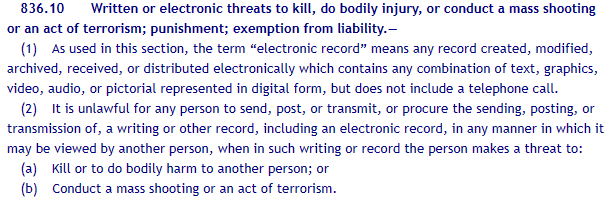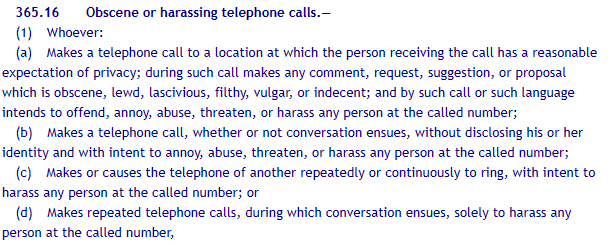Is Doxxing Illegal In Florida?
Laura Martisiute
Reading time: 6 minutes

Table of Contents
If you’re living in Florida and notice that your personal information is published online without your knowledge, you’ll probably wonder: Is doxxing illegal in Florida?
This guide explores the legal landscape in Florida, examining how doxing is treated in the state and what steps you can take to protect yourself from getting doxxed in Florida or anywhere else in the United States.
Is Doxxing Illegal In Florida?
In Florida, doxxing (i.e., the act of publishing someone’s personal information – like their name, address, phone number, or other personal details – online without their consent) is not considered illegal behavior.
Doxxing Related Activities That Are Illegal In Florida
While there are no distinct state laws that directly address doxxing, the act can lead to other illegal activities under Florida law.
For example, cyberstalking, threatening or extorting someone, sending threatening letters, and making harassing phone calls.
Cyberstalking
Doxxing can frequently result in cyberstalking. This is when someone uses electronic communication for online harassment or to threaten a specific person, putting them in reasonable fear for their safety or the safety of their loved ones.
In Florida, cyberstalking is a serious offense. Florida Statute 784.048 prohibits stalking and cyberstalking.
Besides harassing someone electronically, the statute makes it clear that a person can also be charged with cyberstalking if they access or try to access your accounts or internet-connected home electronic systems. For this to be illegal, they must do so without your consent, with the aim of causing substantial emotional distress, and with no legitimate purpose.

If you are guilty of breaking Florida’s cyberstalking law, you can be charged with first-degree misdemeanor. This crime is punishable by jail time (up to 12 months) and a fine (up to $1,000).
Aggravated stalking, involving credible threats, is a third-degree felony with more severe penalties. Cyberstalking is also a third-degree felony in Florida if the victim is a child under 16 years old or if the stalker violates an injunction for protection or a similar court order.
Threats and extortion
If someone has access to your private information, they may use it to threaten or extort you.
The Florida Statute 836.05 criminalizes extortion. This includes maliciously threatening to accuse someone of a crime, injure a person, damage property, or harm reputation to extract a monetary advantage or compel them to perform/refrain from performing a specific act against their will.

Extortion can be made verbally, in writing, or printed communication.
Extortion is a second-degree felony punishable by prison time (up to 30 years) and a fine (up to $10,000).
Written threats
Once someone has your contact details, they can send you threatening letters.
Sending threatening letters is a punishable offense under the Florida Statute 836.10. The statute defines the offense as sending a person written or electronic communication threatening to injure or kill them or conduct a mass shooting or an act of terrorism.

The threat also applies if the person threatening someone publishes the threat on their own Facebook page, and the person being threatened reads that threat later.
To be convicted, it’s not necessary for the person threatening someone through written communication to have the intent to harm the victim.
Classified as a second-degree felony, the crime of written threats involves severe consequences. Those found guilty face penalties including prison (up to 15 years), probation (up to 15 years), and a hefty fine (up to $10,000).
Harassing phone calls
Access to your contact details also means that someone could make harassing phone calls to you.
Making phone calls to harass someone is considered illegal in Florida. This falls under State Statute 365.16.
Under Florida Statute 365.16, harassing phone calls are defined as making calls to a location where the recipient reasonably expects privacy, making obscene comments or suggestions, or repeatedly calling to harass the recipient (even if no conversation ensues).

Making harassing phone calls is a second-degree misdemeanor in Florida. Those convicted of making harassing phone calls can face jail time (up to 60 days) and a fine (up to $500).
Is Doxxing Illegal at the Federal Level?
There isn’t a specific federal law that would make doxxing illegal. But when doxxing happens, other illegal activities that violate federal laws can frequently occur.
The reason doxxing is not illegal is that it usually involves publicly available information. That includes your name, home address, email address, etc. That said, a growing number of states, like California, Illinois, and Arizona, are enacting anti-doxxing laws.
This absence of a federal statute highlights the importance of personal measures to protect oneself from doxxing. Being proactive and making oneself as undoxxable as possible is essential in this digital era, where personal information can easily be exposed and misused.
How to Protect Yourself Against Doxxing In Florida (And Elsewhere)
To reduce the likelihood that you’ll be doxxed, you need to
a) Figure out how much information there is about you online currently.
b) Delete or obscure as much of this data as possible.
Start by doxxing yourself (follow our guide on how to do this and check out our list of doxxing tools). Once you’re aware of what personal data is published about you on the internet, you can take steps to remove it.
This might involve:
- Removing your name from data brokers and people search sites. Data brokers collect personal information (including your family members’ details) from various online and offline sources and then collate it into profiles that are sold to anyone, including marketers, politicians, cybercriminals looking to carry out identity theft, and individuals who engage in cyberbullying and public shaming. Since data brokers relist your information when they find more of it, you’ll need to repeat the opt-out process regularly. Alternatively, subscribe to a data broker removal service like DeleteMe.
- Making your social media accounts private and adjusting privacy settings.
- Using unique usernames and passwords across your social media and other online accounts and enabling multi-factor authentication.
- Downloading fewer apps (they can sell your data to data brokers).
- Removing personal data from Google Search.
- Being careful about what you say and share online – especially when it comes to sensitive information like social security numbers (remember: even if you delete a social media or forum post later, you never know who might have already taken a screenshot of it).
For more information, read our guide on how to prevent doxxing.
Our privacy advisors:
- Continuously find and remove your sensitive data online
- Stop companies from selling your data – all year long
- Have removed 35M+ records
of personal data from the web
Save 10% on any individual and
family privacy plan
with code: BLOG10
news?
Don’t have the time?
DeleteMe is our premium privacy service that removes you from more than 750 data brokers like Whitepages, Spokeo, BeenVerified, plus many more.
Save 10% on DeleteMe when you use the code BLOG10.
















